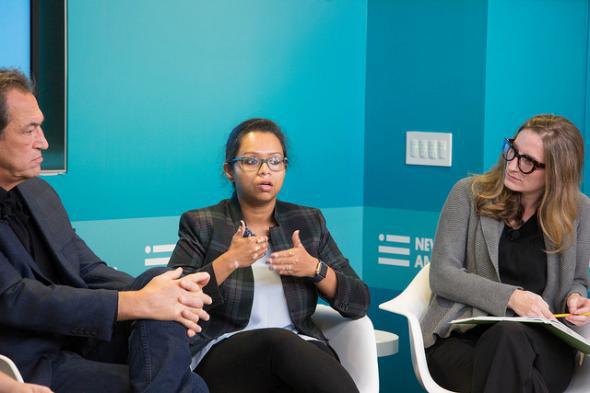Though the impact our digital habits have on mental health may be increasingly grabbing the spotlight, there’s less talk about how these same technologies may one day be used to revolutionize how we treat mental illness.
On Sept. 28, Future Tense convened leading researchers in the field to discuss the ways technology is changing approaches to psychiatric study and care. The question at the heart of the discussion was: Are we on the verge of a new era in psychiatric care, or will these treatments go the way of other now-condemned methods?
The first panel discussed the proliferation of apps that collect data from a patient’s smartphone app to draw conclusions about his or her mental health. Apps can reveal how often a patient has been communicating with loved ones, or whether their syntax is changing in text messages—things that could indicate whether they might be starting to experience a manic episode, for instance.
Steven Chan—who is a clinical informatics fellow at the University of California-San Francisco and has worked with an American Psychiatric Association group to address these questions—touted the value of apps that allow clinicians to monitor their patient’s behaviors. Given the shortage of psychiatrists in both the United States and abroad, increasing access is one of the most promising aspects of mental health tech.
Apps can also provide users with the kind of social connections that psychiatric disorders can inhibit. Journalist David Dobbs shared with the audience his experience reporting on PRIME, an app created for people with schizophrenia so they can support one another. It’s still experimental, but it’s promising. “It’s easy to overlook the power of the smartphone to connect people with a mental health challenge to connect and compare notes,” said Dobbs.
But speakers warned about the consequences of quickly scaling up apps in mental health treatment. For instance, many apps fail to inform users of their privacy policies, if they have them at all. Regulation is also falling behind.
John Torous, co-director of the digital psychiatry program at the Beth Israel Deaconess Medical Center, cautioned against seeing big data collection as a magic fix for mental health care. Psychiatric treatment needs to be personalized to each patient—there’s no one-size-fits-all app that will work for different disorders. “That’s part of the question—who do we target these things to? Who’s going to respond best to a technological intervention?” said Torous.
Following the first panel, Skip Rizzo, director for medical virtual reality at the University of Southern California Institute for Creative Technologies, presented the audience with examples of how he’s incorporated VR and simulated humans in a variety of situations, including treating PTSD in veterans. “Of any application area for VR, mental health has some of the most evolved psychology,” Rizzo said. He said he’s found that many veterans who would shy away from seeing a “shrink” are more willing to open up to a virtual assistant. According to Rizzo, consumer VR has the ability to push more therapy into the home environment.
The final panel of the event discussed how the emerging field of “computational psychiatry” isn’t just about incorporating technology into treatment—it also offers new opportunities for prevention and diagnosis. Munmun De Choudhury, assistant professor at the School of Interactive Computing at Georgia Tech, studies how to make sense of human behavior as manifested in our online footprints, and she sees a lot of potential in combining computer science and social data. “A lot of our research has been on the detection side, thinking about how we can develop new algorithms that would help us discover these kinds of cues … that may relate to people’s mental health status and how we can provide insights into people who are likely to be at risk going forward,” she said.
For instance, Sarah Fineberg, an instructor and researcher at the Yale University Department of Psychiatry, talked about her work with people who have borderline personality disorder. Borderline personality disorder involves difficulty with interpersonal relationships, but those can be difficult to assess. Right now, a lot of the research surrounding how people interact is limited to one-dimensional tools, like seeing how a patient reacts to facial expressions. Fineberg’s approach instead uses “complex games” to see how patients interact with others—something that could shed new light on the poorly understood disorder.
For De Choudhury, mining people’s behaviors on social media offers valuable clues. “A lot of our research has been on the detection side, thinking about how we can build new kinds of algorithms that can help us discover these kinds of cues [that may relate to] people’s mental health status and how we have them to provide insights to people who may be at risk going forward or are at risk,” said De Choudhury.
Data may also be able to help clinicians forecast suicide risk, something that still proves extremely difficult for treatment providers. “We need to get better at suicide prevention,” said Fineberg, “And any little data-based help that’s effective would be an enormous benefit.”
But making the power of big data and algorithms accessible to doctors still poses a big challenge. “A lot of the algorithms and language tools are fairly opaque to people who aren’t an expert on those things,” said De Choudhury. “We’re not saying clinicians are no longer needed, but rather, how can we empower them?”
Rizzo noted that in his area, well-intentioned developers with backgrounds in virtual reality don’t understand the audience they’re building mental health apps for. “When you’re building [for mental health] you have to appeal to a higher standard,” said Rizzo.
But the speakers shared optimism for the potential of these new technologies to bring a more forward-thinking approach to the mental health field in the decades to come—if everything is done right. “Technology is a useful mediator but … it’s people supporting it. The app itself is just an app,” said Torous.
